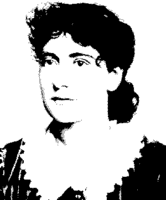
Yvonne Kapp's two volume biography of Eleanor Marx is probably one of the least well known biographies but it deserves to be on every readers bookshelf, both leftie and not, for the simple reason that it is a fantastic study in the art of biography writing.
Eleanor Marx was Karl's third daughter. Her life was overshadowed by the activities of her father. But she carved an independence that is remembered, celebrated and praised by socialists to this day. Ultimately she became one of the foremost activists of her time, leading strikes and struggles and becoming the head of one of the largest of the "New" unions.
The first part of her life was marked by poverty. It is also inseparable from that of her father and wider family. Yvonne Kapp doesn't shy from explaining why Marx's work and life is more important during the first decade or so of Eleanor's life - not because Eleanor is boring, but because her own life's work was founded on the principles and ideas that her father worked out and outlined.
Indeed Eleanor's early life is amazing. She was intelligent and well educated, a friend to the countless people who passed through the Marx household. At an early age she joined demonstrations and spoke passionately about causes such as Ireland and freedom.
The biography is in two parts. The second half is going to be more exciting in some senses. The period of "New Unionism", William Morris, the Match Girls strike etc. But do not underestimate what you can learn and enjoy from an early life that included sheltering refugees from the Paris Commune and helping Karl Marx work in the British Library.
Ultimately Eleanor Marx will be remembered through this wonderful work. It is to Yvonne Kapp's credit that she keeps the essence alive of what made Eleanor such an incredible woman - her politics. The gossip, fabrications and discussions are there - after all it was snobbish Victorian England. One establishment 'lady' wrote that Eleanor Marx,
"Lives alone, is much connected with the Bradlaugh set, evidently peculiar views on love etc, and should think has somewhat 'natural' relations with me! Should fear that the chances were against her remaining long within the pale of respectable society".
But these details help illuminate the woman, rather than bore us with murky details. After all Eleanor Marx was someone who believed that humans can change the world they live in, and that they must be politically active to do so.
Full title - Eleanor Marx, family Life 1855 - 1883
Related Reviews
Mehring - Karl Marx - The Story of his Life
Hunt - The Frock Coated Communist; The Revolutionary Life of Frederich Engels
